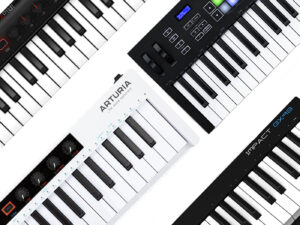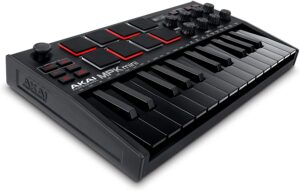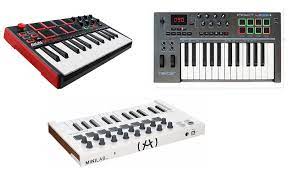MIDI keyboards have carved a name for themselves when it comes to music production, and sadly, there are people who do not or cannot identify with MIDI keyboards. Most people into music cannot tell what MIDI keyboard is best suited for music production, and identifying the best MIDI keyboard for sale on the market seems impossible to them. In music today, there are digital languages that enables musicians to utilize MIDI keyboards in making various kinds of sounds from a keyboard, and musicians can also use these devices in communicating with other systems. MIDI today has become as relevant as the guitar, and MIDI keyboards can be combined with pads to back tracks and trigger loops for better performances. It doesn’t matter if you intend programming complex drum patterns or you are playing directly from a DAW, the MIDI world is very challenging for almost everybody.
How To Setup A MIDI Keyboard
When setting up a MIDI keyboard, there are three main features that you will require. These features are;
- USB Ports
- Traditional MIDI ports
- Bluetooth connection
Taking a look at the outputs on a MIDI keyboard, check to see if there are MIDI ports. Traditional keyboards tend to come with MIDI in and out, or it might just have a MIDI out. You shouldn’t be worried about that as it is fine, but when you go on the internet like YouTube, you will find tons of videos that will teach you several ways of connecting or setting up a MIDI keyboard. Good MIDI keyboards are a must have for every musical studio, and MIDI keyboards can be trusted if you want to take your musical recording to a higher level. MIDI keyboards can be directly plugged into a laptop or PC using its USB connection, and Bluetooth connection can be used in other cases.
What most people love about MIDI keyboards is the double up and serve as control over your hardware synths, making them act as a central hub for your studio setup. Looking at the market today, you will find out that there are a lot of MIDI keyboard options for you to choose from, and whatever you choose to go for depends on what your personal needs are. You can opt to go for a full sized MIDI keyboard, or you can decide to go for a portable or compact MIDI keyboard that can easily fit into a laptop bag. The MIDI keyboard options we will show you comes with additional features like faders, buttons, pads, and knobs, so you can have absolute control over software, or to enhance your creativity levels.
Content Navigation
Best MIDI Keyboard – Buying Guide And Recommendation

At some point in a musicians life, he will love to be seen as the next Mozart genius, and this will require you to have the best MIDI keyboard in your studio that guarantees impressive functionality and fun. Pianos have various keys that are best suited for various musical genres, and this helps in adding a layer of diversity in your music. It is impossible for musicians to move around with a grand piano, and this is the point where a MIDI keyboard comes in handy. Every versatile MIDI keyboard opens users to a world of limitless possibilities in music, and unlike digital pianos, MIDI keyboards are not designed to generate sounds when a key is pressed.
What MIDI keyboards do when a key is pressed is it sends signals to connected devices, enabling users to control the sound from the connected device. There are essential features a MIDI keyboard comes with that you will not find in a regular piano. These features include assignable buttons, drum pads, and knobs. If you are in the market today to shop for a MIDI keyboard, the question you should have answers to are;
- Which MIDI keyboard is the best on the market
- Why is a MIDI keyboard considered as the best on the market
- How do i identify the best MIDI keyboard on the market
Providing answers to all of the three questions mentioned above means you are halfway towards achieving your shopping goals.
Best MIDI Keyboard Review
1. AKAI Professional MPK Mini MK3

We are opening up this review with the AKAI Professional MPK Mini MK3 MIDI keyboard which boasts of a 25-key keyboard for beat production, virtual synthesizer, and studio production. Interestingly, this MIDI keyboard offers users complete control over production as it comes with a four-way thumbstick for modulation control and dynamic pitch. It also boasts of having an 8-backlit velocity key with MIDI pads for full level programming, DAW control, virtual synthesizer control, and triggering samples. This MIDI keyboard comes with about one thousand, five hundred in-built sounds, and everything you need for pro production can be found in this MIDI keyboard.
Specifications
- Brand – AKAI
- Item Weight – 1.98 Pounds
- Color – Black
Key Features
- USB powered
- Production starter kit
What We Like
- It has a cool hardware design
- It has a solid key construction
- Its screen proves to be a nice addition
What We Don’t Like
- It is not for beginners
2. Alesis V49 – 49 Key USB MIDI Keyboard Controller

Up next that we want our readers to check out when shopping for a MIDI keyboard is the Alesis V49 MIDI keyboard which comes with 49 velocity sensitive keys for controlling virtual instruments. Interestingly, this MIDI keyboard also boasts of having an 8 pressure sensitive, backlit pads that’s suitable for clip launching and beat production, and users can have full access to keyboard pitch and range using its octave up and down buttons. With this keyboard, you can be able to deliver creative and expressive sounds, and it also comes with high-quality software that will take your music production to the next level.
Specifications
- Brand – Alesis
- Item Weight – 6.27 Pounds
- Color – Black And White
Key Features
- Ableton Live Lite 9
- First Alesis Edition
- DB-33 Virtual Instrument
What We Like
- Its editor makes changing between pads very easy
- This keyboard’s overall build is topnotch
- It is affordable
- Its pads works for fast drumming
What We Don’t Like
- Users complained about this MIDI keyboard having an awful and horrifying dynamics
3. midiplus, 32-Key Midi Controller, 32-Key (AKM320)

The interface design of this MIDI keyboard is clear and simple, while having a thin and lightweight body makes this the most enviable MIDI keyboard with a sleek body profile on the market. Surprisingly, this keyboard doesn’t occupy too much space anywhere it is kept, and users will find it easy and convenient to carry outdoors. The basic functions of this MIDI keyboard are simple and easy to understand, and there will be no need to install any drivers as this keyboard comes with a MIDI out. With its MIDI out, you can play your music irrespective of where you are, and this is one keyboard that boasts of variety of features that makes production and editing very easy.
Specifications
- Brand – Midiplus
- Item Weight – 1.59 Pounds
- Item Color – Black And White
Key Features
- USB powered
- Octave up and down buttons
- Sustain switch interface
What We Like
- It comes with more keys than advertised
- This MIDI keyboard is best for anyone on a budget
- It is recommended for use in home studios
- It boasts of a very well thought design
What We Don’t Like
- It isn’t a plug and play as advertised
- Its cable doesn’t function
4. Nektar, 49-Key Midi Controller (SE49)

Whatever controls and features you need to start making or creating music on your computer can be found on the Nektar, 49-Key MIDI keyboard, and what amazes people about this MIDI keyboard is the fact that it can be gotten at an affordable price. It comes with a Nektar DAW integration that allows users have complete control over music software, and taking control of musical software includes rewinding or playing tracks without using the mouse, hitting record, changing instrument sounds, and changing tracks. Its 49 full sized keys adjust to match your playing style, what’s more, this MIDI keyboard is compatible with Apple iOS, Windows, OSX, and any DAW or MIDI software.
Specifications
- Brand – Nektar
- Item Weight – 4 Pounds
- Item Color – Black, White, Grey
Key Features
- USB powered keyboard
- USB Cable user guide
- Nektar DAW integration
What We Like
- It has a seamless plug and play function
- It has the perfect size
- It is easy to use
- It is an inexpensive MIDI keyboard
What We Don’t Like
- This keyboard has latency problems
5. Alesis Qmini – Portable 32 Key USB MIDI Keyboard

We are rounding up this review with another impressively built and high quality MIDI keyboard from the Alesis brand, and without so much talk, you should be convinced that the Alesis brand only specializes in making reliable and premium quality MIDI keyboards. This 32-key MIDI keyboard is best used for virtual synthesizer, studio production, and beat production. Thanks to its Octave and Transpose buttons, users will be able to have full access to its range. It also comes with modulation controls and pitch blends for easy control, and it also boasts of an assignable volume knob for handling tactile control.
Interestingly, this keyboard boasts of a universal compatibility with several music production apps that works with a MIDI keyboard, and these music production apps includes, Logic, Cubase, ProTools, Ableton Live, MPC Beats, and many more. The fact that this MIDI keyboard allows users to make music anywhere makes it one of the most sought MIDI keyboards on the market, and finally, it comes with professional software suite like AKAI professional MPC beats, First Alesis Edition / Pro Tools, and many more.
Specifications
- Brand – Alesis
- Item Weight – 1.1 Pounds
- Item Color – Black And White
Key Features
- Universal Compatibility
- Professional Software Suite
What We Like
- This is a plug and play MIDI controller
- It feels really nice when in use
- There are no audio power issues
What We Don’t Like
- Its keys are not weighted
What MIDI Keyboard Size Do You Need?
Just like we mentioned earlier, there are various MIDI keyboard sizes, and the size you go for depends on what your needs are. Your needs might reflect upon usage or transportation. If you want a MIDI keyboard that you can use for inputting basic chords, melody lines, simple bass, drum beats, then a small sized MIDI keyboard will do the trick for you. Small sized MIDI keyboard have the advantage of being affordable and portable compared to most large sized MIDI keyboards, and people have found out nowadays that mini sized MIDI keyboards with mini keys are very responsive and easy to play.
Furthermore, if you are coming from a keyboard or a piano background, you might what to continue with the experience of playing with a weighted and full sized MIDI keyboard. The good thing about MIDI keyboard is there is an option on the market for everyone. One more thing to bother yourself with when shopping for a MIDI keyboard is knowing how many keys you want. The best MIDI keyboards on the market come with octave shift buttons, meaning a 25-key device gives you access to a range of pitches just by pressing a button. For advanced players who play with two hands, a four octave or five octave keyboard will be just fine.
If your studio has a large amount of space, you might opt for a piano size, 88-key MIDI keyboard. Just like we mentioned earlier, a small sized MIDI keyboard will do if what you want is only for creating basic chords and melodies.
Connectivity
So many producers have learnt how to work in the box on a laptop or single computer. You don’t need a MIDI output except you have a MIDI synth you can connect it with. However, there are traditional MIDI keyboards that come with the regular 5-pin MIDI output ports, and mini, smaller, TRS MIDI output jacks offer same functionality and are becoming very popular.
Conclusion
MIDI keyboards are very interesting musical instruments if you are willing to dig deeper. If you have gotten to this point in this guide, we hope that we have helped you find the MIDI keyboard that will match all of your requirements. You will not go wrong with any of the MIDI keyboards we have talked about in this guide, and we strongly recommend going into stores to check out these products, and know what they function like. Good luck.
Related Posts
Best Bluetooth Speaker Under $50
Best Audio Interface For Voice Over

